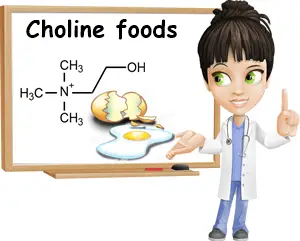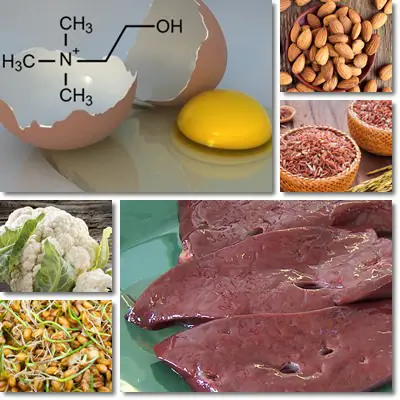Choline is a nutrient of crucial importance to our health. It helps promote brain development of babies in the uterus, prevents neural tube defects as well as premature birth.
In the elderly, adequate choline intakes can help reduce the risk of severe neurological decline, particularly memory loss as well as loss of motor skills associated with common conditions such as Alzheimer’s or Parkinson’s disease.
Research suggests that choline may have a beneficial action of the cardiovascular system as well, protecting against the damaging effects of elevated homocysteine levels.
Lastly, this novelty essential nutrient supports liver function, helping it process fats and cholesterol and send them out to where they are needed in the body, an action which reduces the risk of developing fatty liver disease as well as future complications.
But for us to enjoy all of these wonderful health benefits, we have to include in our diet as many foods rich in choline as possible. See benefits of choline.

Choline is somewhat of a novelty nutrient. Despite the fact that it has been discovered some time ago, it wasn’t until recent years that its crucial impact on human health has been acknowledged.
While the recommended daily intake is set at 550 mg for adult men and 425 for adult women, some people might need more of the nutrient than others.
So in order to get all the choline we need and be healthy, we have to enjoy a good diet, varied and balanced, rich in the best choline food sources.
10 Choline food sources
1) Beef liver
100 g of beef liver supplies 418 mg of choline, making it the best source of the nutrient available to us. Ground beef (93% lean meat) is almost as good with about 84 mg of choline for every 100 g.
In addition to generous amounts of choline and a variety of essential nutrients, particularly B vitamins and iron, beef liver and lean ground beef also provide essential and non-essential amino acids, making it a source of quality protein.
2) Chicken liver
Chicken liver provides 290 mg of choline for every 100 g of simmered liver, ranking second in the top choline food sources list. Chicken giblets provide about 178 mg of choline for every 100 g.
If liver and giblets in general are something you do not feel comfortable eating, know that simple chicken meat can supply good amounts of choline as well (67,60 mg for every 100 g of roasted chicken thigh with skin or 69,70 mg for every 100 g of stewed chicken leg meat).

3) Eggs
The ultimate food, the egg contains a variety of elements our body thrives off. From healthy Omega-3 and Omega-6 fatty acids to cholesterol for a healthy brain to all the essential amino acids our muscles, hair and nails need to stay in perfect health, eggs have it all.
See our eggs page to choose the best egg variety for you. As for choline, amounts may vary slightly depending on the cooking method employed:
Fried whole egg: 317,10 mg of choline per 100 g
Hard boiled whole egg: 293, 80 mg of choline per 100 g
Egg omelet: 247,60 mg of choline per 100 g
Poached whole egg: 234,10 mg of choline per 100 g
4) Turkey liver
100 g of simmered turkey liver supplies about 220 mg of choline. Roasted turkey meat has about 89 mg of choline per 100 g.
Despite being reduced to a meat variety that is rich in saturated fats and calories, turkey meat is actually healthy when consumed in moderation (1-2 servings a week) as it supplies generous amounts of B vitamins and dietary minerals such as iron and zinc, to name a few.
5) Wheat germ
On average, 100 g of wheat germ provides about 152 mg of choline. Wheat germ is rich in vitamins E, B1, B2, B6, B5 and B9, manganese, magnesium, zinc, phosphorus, iron as well as dietary fiber.
6) Shrimp and fish
100 g of cooked shrimp provides about 135 mg of choline. Fish are also good sources of the nutrient with smoked haddock providing about 92 mg of choline per 100 g, salmon over 85 mg, canned mackerel 85 mg and Atlantic cod about 84 mg of choline.
7) Nuts
While nuts in general are healthy options for anyone that is not allergic to them, when it comes to choline, pistachios, peanuts, cashews and almonds are the best sources.
However, remember to choose either raw or dry roasted varieties so not to add to your calorie intake, and unsalted brands to actually enjoy some cardiovascular benefits.
Pistachios (dry roasted): 71,40 mg of choline per 100 g
Peanuts (dry roasted): 64,60 mg
Cashews (dry roasted): 61 mg
Almonds (dry roasted): 52,10 mg
8) Dried sweet whey and whey protein
100 g of sweet, dried whey contains about 225 mg of choline, while whey protein (powder isolate) has about the same amount.
While whey and whey protein are not something the average person eats on a daily basis, bodybuilders and sports enthusiasts looking to bulk up in a healthy manner should consider these healthy options.
9) Cauliflower and other (cruciferous) vegetables
Cooked green cauliflower has about 58,80 mg of choline per 100 g, while boiled white cauliflower provides around 39 mg of choline. Broccoli, cabbage, artichokes and collards are also good options for increasing our choline intake: boiled (unsalted) broccoli contains about 40 mg of choline for every 100 g, boiled (unsalted) cabbage about 20 mg, boiled (unsalted) artichokes 34 mg, while (boiled) unsalted collards about 45 mg.
10) Beans
Boiled, unsalted kidney beans contain around 30 mg of choline per 100 g. They are also a rich source of dietary fiber and protein, not to mention they boast a generous nutritional profile and are accessible to all.
Overall, lean beef meat and beef liver as well as poultry giblets, particularly liver, are the best food sources of choline.
Together with eggs, some fish and nuts, they are the most likely to help us meet our daily demands of this important nutrient. But considering that we are all different people with different nutritional requirements, it is impossible to estimate exactly how much choline each and every one of us needs on a daily basis.
Conclusion
Stress, disease and other factors may influence our choline dietary needs immensely, meaning we might need more or less of the nutrient than others.
While animal food sources are the best options, followed closely by several nuts and a few vegetables, fruits are the lowest in the nutrient.
Lastly, meeting our daily demands does not mean we have to focus our diet solely on the foods richest in choline, but rather eat enough so we meet our choline demands without neglecting our body’s requirements of other essential nutrients.
